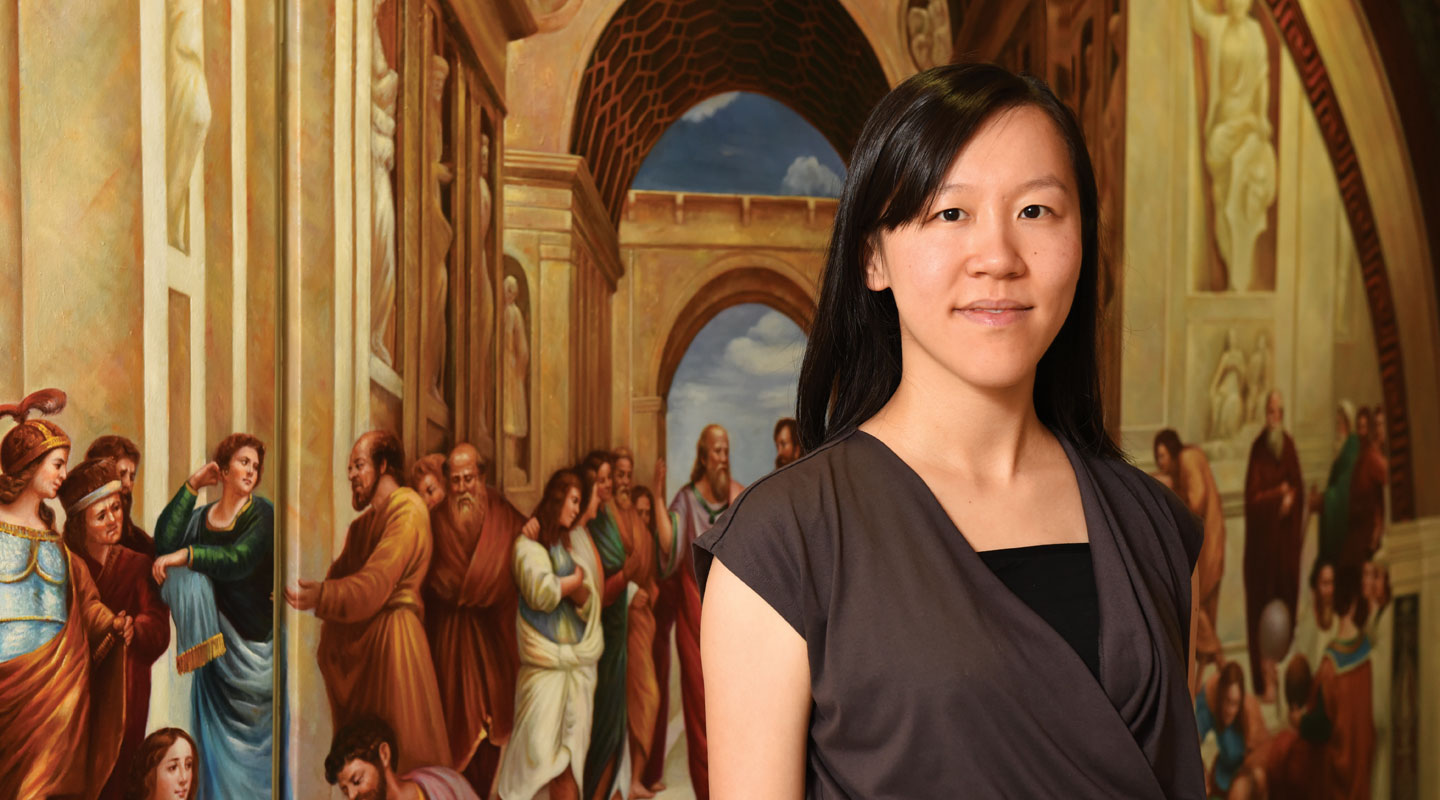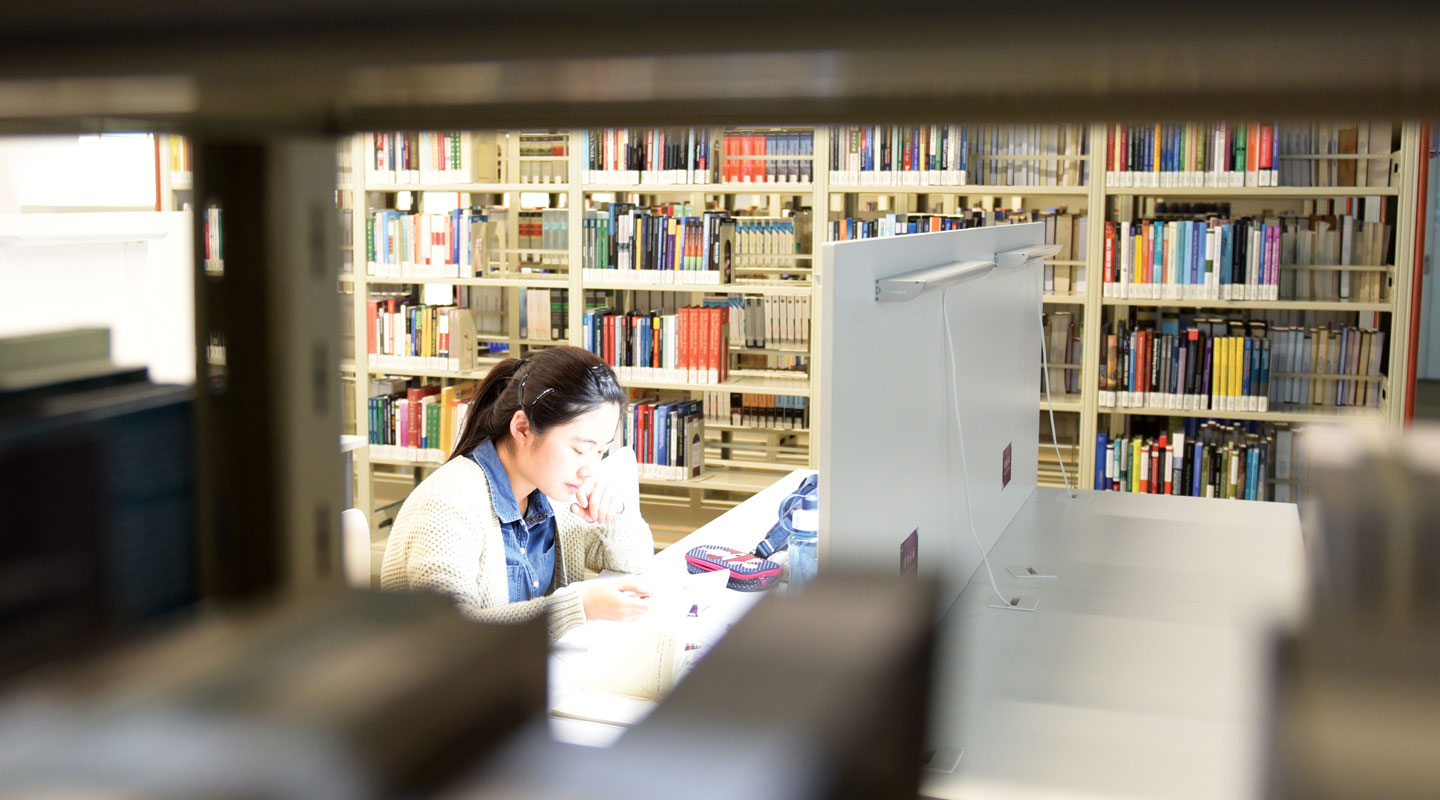Dear readers, With the launch of e-newsletter CUHK in Focus, CUHKUPDates has retired and this site will no longer be updated. To stay abreast of the University’s latest news, please go to https://focus.cuhk.edu.hk. Thank you.
The Joys and Anxieties of a Humanities Education
Evelyn Chan talks about the use and value of a degree in literature

When she was reading English as an undergraduate student at CUHK, Evelyn Chan did not feel she needed to study something highly relevant to a specific career path. It was while doing her PhD project at Cambridge that she began to have questions of the meaning and value of her work. For many students of literature, however, the question ‘What are you going to do with a degree in literature?’ would have come nagging much earlier.
Prof. Evelyn Chan has now returned to serve at her alma mater as a faculty member of the Department of English. But in addition to literary research which has resulted in a book on Virginia Woolf, she has also published on education, the humanities and the professions. In an empirical and methodologically argued paper published in 2015 in Studies in Higher Education, she has tried to understand how students of literature view themselves within their major and the meaning of their own education.
Professor Chan explained why she had crossed from dead authors to live subjects. ‘I wanted to know for the purposes of improving my own teaching and making it more relevant to the students how English majors perceive and construct their own identities and whether we can learn from this to improve humanities education. Getting to the answers required social research methodology and data from real interviews with students.’
Methodology and Findings
From her elective course ‘Literature and Education’ offered to undergraduate students of English, she conducted 15–20 minute interviews with eight students. The students were invited to talk about the meaning of being a student in literary studies to them in an open-ended narrative format. After collecting such narratives Professor Chan conducted systematic analyses of the contents to identify emergent ideas and observe the identity creation and the progression of conflicts in the narratives.
In their responses, all the students emphasized personal values and development gained from their literary studies, citing, for example, the ability to ‘think out of the box’ and to make ‘keen observations’ because of the habit of ‘close reading’ in their studies. Professor Chan had expected but was still pleased to see that the first global theme that emerged from this study is that literary studies lead to wider and deeper understanding and thinking. Half of the students were more or less at home and at peace with their subject, that is, they have attained fairly stable subject identity and most of the problems or conflicts were overcome or resolved (‘literary studies are more fun and have practical use’). But the other half still exhibited anxiety and undecidability and were more concerned with others’ negative views of English majors.

Navigating a Misty Sea
The second global theme that emerged from the study was the issue of students connecting their subject to other social domains they inhabit or intend to inhabit. Professor Chan said that this theme is important as ‘it helps with identifying some of the struggles students face as they make these connections. It helps them, and us teachers, look at possibilities for linking their major studies to their other interests and activities. A major in English, as in all other disciplines, should not be seen as an isolated activity to be only confined to the classroom and the university. But these connections may not be straightforward and I believe they need to be encouraged and constantly reflected on individually by the students themselves.’
Is it normal that half of the students she interviewed had difficulty translating their subject identity into potential future social identities? Professor Chan said, ‘Students don’t generally enter university knowing precisely who they are and what they want to do in life. So I would see it very much as part of growing up and finding themselves, which is an essential part of university life. In this sense, whether one majors in the humanities or other disciplines makes little difference. I see the continued reflection on the meaning and value of one’s studies not as destructive—it is not a cynical, skeptical pursuit—but an affirming, necessary, positive and continuous experience.’
Capstone to the Outside World
In her paper, Professor Chan suggests that a capstone course can provide the necessary guidance to humanities students in making connections to the outside world. A capstone course is already part of the Department of English’s requirement for graduation. Professor Chan said, ‘Such a course can obviously be very challenging for students, as many students may not yet have very concrete plans for their lives after graduation. But it is an exercise that is important in form as well as substance. It is much less about making students follow up on specific career plans that they can link to their project work, and much more about starting a process of self-reflection, so that they can continue to make such links for the rest of their lives. That way their studies will continue to be relevant to them no matter what their interests or occupations may be—and they will hopefully continue to reflect actively on these relevancies.’
Apology Not Required
Coming back to the ultimate question on the use of a degree in literature, Professor Chan said, ‘This question is tied to other questions that the student should be encouraged to think about: What do you find inspiring and stimulating? What interests you the most? What are you particularly good at? What gives you the greatest sense of meaning and fulfillment? Then I would ask: How does that link back to what you’ve done in your degree? When you remember a course as having been particularly stimulating and enriching, can you explain why specifically with reference to your own interests and the questions that drive you as a person, instead of speaking in very general terms?’
Lastly, Professor Chan gave an affirmative verdict to an undergraduate commitment to the humanities: ‘For example, having been personally moved by particular literary portrayals or texts can also be extended to broader interpretations of the student’s personality, interests and abilities, which in turn may map onto specific careers outside of academia, if the student decides academia is not the path to take. A degree in literature therefore becomes a journey of personal growth and self-discovery, towards a self-authored destination afterwards.’
This article was originally published in No. 479, Newsletter in Jun 2016.
Read More: